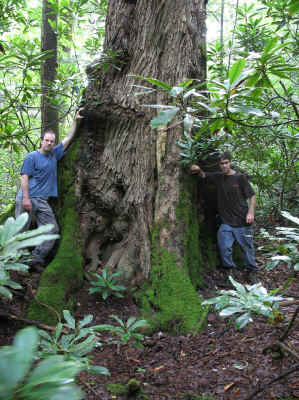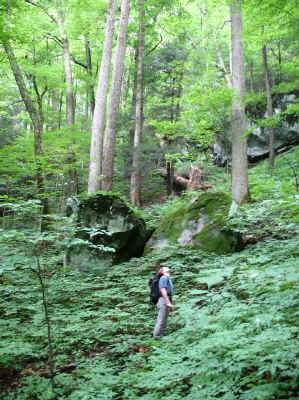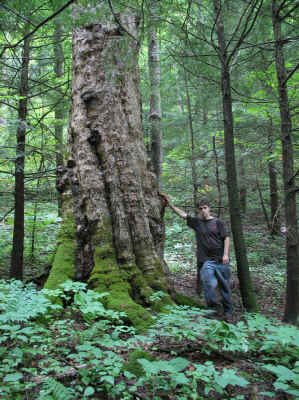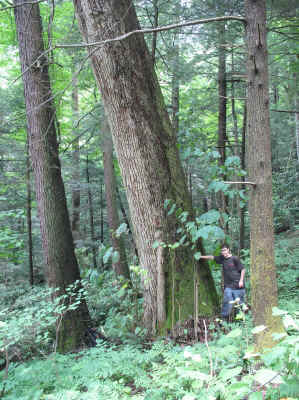Ents,
A few weekends ago, Will Blozan and I packed up a tripod and
monocular
and headed off to the Cosby, Tennessee section of the Smokies.
Our
targets for the day were the national champion red maple and a
former
national champion yellow buckeye. The current national champion
buckeye had recently fallen, so this trip, in addition to
gathering
volume information, would confirm the former champ is still
alive to
reclaim its title. Similarly, the red maple had not been seen in
several years, and had never been visited with a rangefinder.
We quickly hiked up the Maddron Bald Trail through dense stands
of
tuliptrees that sprang up when farmers abandoned their fields as
the
park was formed. We continued past the old fields into
old-growth for
only a few hundred feet before veering off the trail towards
Indian
Camp Creek.

The current national champion red maple on Indian
Camp Creek, GSMNP, TN.
The champion red maple stands on a gently inclined
strip
of ground between the deeply incised creek and a rocky
depression with
a trickle of flowing water. Hemlocks, Fraser magnolias, and
other
large red maples share the moist but well drained ground, and a
dense
growth of rosebay rhododendron fills in the understory.
Surprisingly,
a single mature umbrella magnolia also grows in the record
tree's
shade at an unusually high elevation for the species of over
2800'.

Another view of the champion red maple.
The maple has an unusual and asymmetrically buttressed base due
to
growing half-on a large boulder. Above that massive, fluted,
21'10"
cbh base, a large trunk rises and gradually tapers to the first
limb
at about 48' above the ground, which is over two feet in
diameter.
Below the limb the trunk is 13.6' in circumference, and above
the
limb, the trunk is an 11.2' circumference column until forking
at
slightly over 65' above ground. From there, two branches, each
over
two feet in diameter, carry the crown to 119.9'. The crown
formed by
the three large branches appears full and vigorous. Below the
fork,
the trunk contains 1045 cubic feet of wood. We do not have a
good
estimate of the branch volume yet, but if the branches are
treated as
cones, which I believe significantly underestimates their
volumes,
they contain 235 cubic feet of wood. Those estimates give a
total
volume of at least 1280 cubic feet, far less than either of us
initially thought.

Rich cove forest in an unnamed cove between Indian Camp
Creek and Jones Branch, GSMNP, TN.
From the maple we proceeded to the former champion yellow
buckeye via
a highly circuitous route. We ascended a narrow, north facing
cove
that contained a 12'1.5" x 156.8' hemlock and a rich cove
forest
featuring many mature sugar maples and buckeyes. The east side
of the
cove supported markedly different vegetation, so a quick jaunt
over
the ridge to the next cove became a scramble through mountain
laurel
and the tops of table mountain pines killed by pine beetles
during the
droughts of a few years ago. However, the other side of the
ridge,
upper Jones Branch, featured more open, rich cove forest.
Descending
Jones Branch back to trail, we quickly encountered a stout,
14.27' cbh
white ash.

The new Smokies park diameter record sugar maple on Jones Branch, TN
Farther down the stream, a burly 14.44' cbh sugar
maple is
the new park diameter record, but does not have a particularly
large
trunk or great height.

The basswood on Jones Branch |

A large basswood on Jones Branch, TN
|
Nearby, a potential Tennessee state
champion
basswood grows on a slope and has reached 13'11" x 130.6' x
65'.
We took the Maddron Bald Trail back down to the Gabes Mountain
Trail,
which wound through older forest to Cole Creek. The stream's
narrow
watershed harbors hemlock covered slopes and a narrow band of
richer
forest along the creek.

The former national champion yellow buckeye on
Cole Creek, GSMNP, TN
In that rich strip, and right beside the
creek, grows the former national champion yellow buckeye
surrounded by
basswoods, yellow birch, sugar maples, hemlocks, and a few other
buckeyes. Or at least, that is where the tree grew. We were
saddened
to see that pathogens have reduced the tree's crown down to a
few
dozen leaves on one small branch; the tree will probably not
leaf out
again next year. Viewing this trip as our last opportunity to
collect
volume measurements before the tree starts breaking up, we went
ahead
and set up the monocular. The tree has a huge base that rises
out of
a bed of stinging nettle and waterleaf and is 18'1" cbh.
The trunk
quickly tapers to 15'11" at eight feet above ground, but
then assumes
a much more columnar form. The trunk stays over 12' in
circumference
for the next 40' then tapers some before forking at 61' above
ground.
One fork is snapped off, but the other continues up to a total
height
of 135.1'. Those forks and the main trunk allow the tree to
amass
1020 cubic feet of wood, not including the large branches and
forks of
the upper crown. The total wood volume likely approaches 1200
cubic
feet.

A vivid Bolete fungus growing beside the Gabes Mountain
Trail, GSMNP, TN
On the way out, we made one last stop to measure a healthy beech
near
the trail. The beech has a 10'11" cbh with a full crown
that tops out
at 124.7'.
Jess Riddle & Will Blozan
|